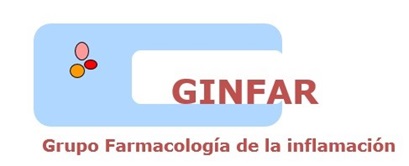For several years we have been investigating the mechanisms involved in inflammatory processes. Our work has focused on a series of aspects such as the study of the determining mediators of the progression of joint injury, the possible protection mechanisms and the main signaling pathways involved, in order to better understand the pathogenesis of inflammatory-based diseases and find new therapeutic targets.
For this we carry out in vivo and in vitro studies. We use different animal models of acute inflammation (rat and mouse air bag, carrageenan edema, dermal inflammation, intestinal inflammation) and chronic, such as rheumatoid arthritis models (adjuvant arthritis, collagen arthritis, serum transfer arthritis of K / BxN transgenic mice). Models of osteoarthritis due to aging have been developed: such as spontaneous osteoarthritis in STR / ort mice, following the temporal evolution of the disease, with biochemical studies of biomarkers in serum and in joint tissues, radiological and histological studies, etc. All these determinations have made it possible to relate the appearance and progression of the lesions with the age of the animal and propose various mechanisms that can regulate these processes. Animal models of osteoporosis have also been developed in the rat (ACLT + oophorectomy) and mouse (CIA + oophorectomy).
Studies have been carried out in cartilage explants, chondrocytes, synoviocytes and osteoblasts from arthritic patients, to determine the gene and protein expression of factors that may be related to the progression of the disease. The consequences of over-expression (by adenovirus transfection) or inhibition (by gene silencing with siRNA) of these factors on cell metabolism, synthesis and degradation of extracellular matrix components, production of cytokines, chemokines have been determined. , cell growth and differentiation factors, eicosanoids, reactive species, etc. The signaling and transcription pathways related to these factors have also been studied. Studies by our group have demonstrated a protective role of heme oxygenase-1 against cell stress in different cell types and in in vivo models.
Studies have been carried out in healthy fibroblasts and keratinocytes and in psoriatic patients to determine the inflammatory mediators and the mechanisms involved in this pathology. In vitro studies have also been carried out in human microendothelial cells, fibroblasts and keratinocytes, focusing on adenosine as a target that may allow finding new therapeutic strategies for wound healing in highly susceptible population groups such as diabetics, obese and the elderly.
Through the various experimental models indicated above, different groups of anti-inflammatory drugs, some analogues of marine products, have been evaluated. Along these lines, we made a patent for cacospongionolide B, as a new anti-inflammatory phospholipase A2 inhibitor, in collaboration with the CNR of Italy. Recently, we have studied new microsomal prostaglandin E synthase inhibitors, in various models.
Mª Carmen Montesinos Mezquita y Mª Luisa Ferrándiz Manglano
Ministerio de Ciencia e innovación y universidades: SAF2017-85806-R, MINECO











